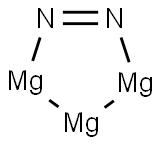Magnesium nitride , 99.5%metalsbasis , 12057-71-5
Synonym(s):
Trimagnesium dinitride
CAS NO.:12057-71-5
Empirical Formula: Mg3N2
Molecular Weight: 100.93
MDL number: MFCD00016205
EINECS: 235-022-1
PRODUCT Properties
| Melting point: | 800°C |
| Density | 2.71 g/mL at 25 °C(lit.) |
| form | Powder |
| Specific Gravity | 2.71 |
| color | yellow cubic crystals, crystalline |
| Water Solubility | Reacts with water. |
| Sensitive | Moisture Sensitive |
| Stability: | Air sensitive. Incompatible with moisture, strong acids, strong bases. |
| EPA Substance Registry System | Magnesium nitride (Mg3N2) (12057-71-5) |
Description and Uses
Magnesium nitride has the molecular formula of Mg3N2 and the molecular weight of 100.9494 g/mol. It can be prepared by the reaction of Mg metal in a pure stream of nitrogen gas:
3Mg + 2N2→Mg3N2
At room temperature and pressure, it is a greenish yellow powder. Its density is 2.712 g/cm3 and it melts at about 1500 °C. Its CAS number is 12057-71-5. It reacts with water to produce ammonia gas, as do many metal nitrides: Mg3N2 + 6H2O→3Mg(OH)2 + 2NH3 In fact, when magnesium is burned in air, some magnesium nitride is formed in addition to the principal product, MgO. Where two Mg2+ ions are directly linked together. The lattice parameter and coordinates of Mg3N2 were obtained. It is a cubic anti-bixbyite structure with lattice parameter a = 9:9528 . The metal (Mg) atoms are in general positions 48 e of space group Ia3 (x; y; z). There are two crystallographically different kinds of N atoms: N1 is in positions 8b (1/4, 1/4, 1/4), and N2 in positions 24d (x, 0,1/4). In this structure, the N-arrays are fairly close to ideal cubic close packing. The 12 shortest N–N distances are in the range from 3.31 to 3.72?. Each nitrogen atom is coordinated by six Mg atoms. N1 has six Mg neighbors with a distance of 2.14?, while N2 is coordinated by six Mg with different N–Mg distances ranging from 2.084 to 2.179. The Mg–Mg distances are 2.72.
The use of magnesium nitride as a convenient source of ammonia allows a direct transformation of esters to primary amides. Methyl, ethyl, isopropyl, and tert-butyl esters are converted to the corresponding carboxamides in good yields.
Safety
| Symbol(GHS) |   GHS02,GHS07 |
| Signal word | Danger |
| Hazard statements | H260-H315-H319-H335 |
| Precautionary statements | P231+P232-P302+P352-P305+P351+P338 |
| Hazard Codes | Xi,F |
| Risk Statements | 36/37/38-14/15 |
| Safety Statements | 26-36-Neverusewater. |
| RIDADR | UN 2813 4.3/PG 1 |
| WGK Germany | 3 |
| TSCA | Yes |
| HazardClass | 4.1 |
| PackingGroup | II |






